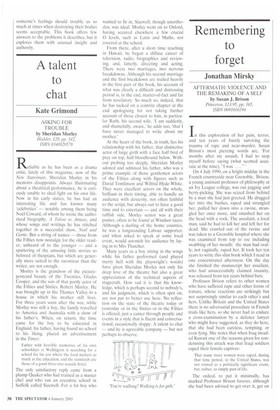A talent to chat
Kate Grimond
ASKING FOR TROUBLE by Sheridan Morley Hodder, £20, pp. 342, ISBN 0340820578 Reliable as he has been as a drama critic, lately of this magazine, now of the New Statesman, Sheridan Morley in his memoirs disappoints. Always illuminating about a theatrical performance, he is curiously unable to shed light on his own life. Now in his early sixties, he has had an interesting life and has known many 'celebrities' — notable among them being Noel Coward, of whom he wrote the authorised biography, A Talent to Amuse, and whose songs and writings he has stitched together in a successful show, Noel and Gerrie. But a string of names — those from the Fifties now nostalgic for the older reader, unheard of to the younger — and a spattering of the amusing little stories so beloved of thespians, but which are generally more suited to the raconteur than the writer, are not enough.
Morley is the grandson of the picturepostcard beauty of the Twenties, Gladys Cooper, and the son of that portly actor of the Fifties and Sixties, Robert Morley. He was brought up in the Thames Valley in a house in which his mother still lives. For three years soon after the war, while Morley was still a boy, the family travelled to America and Australia with a show of his father's. When, on return, the time came for the boy to be educated in England, his father, having found no school to his liking, placed an advertisement in the Times:
Father with horrible memories of his own schooldays at Wellington is searching for a school for his son where the food matters as much as the education, and the standards are those of a good three-star seaside hotel.
The only satisfactory reply came from a plump Quaker who had trained as a master chef and who ran an eccentric school in Suffolk called Sizewell. For a fat boy who wanted to fit in, Sizewell, though unorthodox, was ideal. Morley went on to Oxford, having secured elsewhere a few crucial 0 levels, such as Latin and Maths, not covered at the school.
From there, after a short time teaching in Hawaii, he began a diffuse career of television, radio, biographies and reviewing, and, latterly. directing and acting. There were two marriages, two nervous breakdowns. Although his second marriage and the first breakdown are trailed heavily in the first part of the book, his account of what was clearly a difficult and distressing period is, in the end, matter-of-fact and far from revelatory. So much so, indeed, that he has tacked on a contrite chapter at the end apologising for not taking further account of those closest to him, in particular Ruth, his second wife. 'I am suddenly, and shamefully, aware,' he adds too, 'that I have never managed to write about my mother.'
At the heart of the book, in truth, lies his relationship with his father, that distinctive actor of large girth with a face half bird of prey on top, half bloodhound below. Without probing too deeply, Sheridan Morley adored and admired his father, who was a prime example of those gentlemen actors of the Fifties along with figures such as David Tomlinson and Wilfrid Hyde-White. They were excellent actors on the whole, brilliant in their timing, able to handle an audience with dexterity, not often faithful to the script, but always out to have a good time and to entertain — and all with their raffish side. Morley senior was a great punter, often to be found at Windsor races. Although a darling of the home counties, he was a longstanding Labour supporter, and when asked to speak at some local event, would astonish his audience by laying in to Mrs Thatcher.
Many years as a boy sitting in the wings while his father performed (and played merry hell with the playwright's words) have given Sheridan Morley not only his deep love of the theatre but also a great appreciation of the technical aspects of stagecraft. How sad it is that his knowledge, which is perhaps second to nobody's, and his judgment, which is often spot on, are not put to better use here. No reflection on the state of the theatre today or yesterday or in the Sixties or in the Fifties is offered, just a canter through people and events in a style that is fluent and conversational, occasionally sloppy. A talent to chat — and he is agreeable company — but not perhaps to observe.


















































 Previous page
Previous page